“The sky above the port was the color of television, tuned to a dead channel.” – William Gibson, Neuromancer (1984)
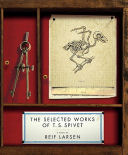 The Selected Works of T.S. Spivet, by Reif Larsen The Selected Works of T.S. Spivet, by Reif LarsenThe Selected Works of T. S. Spivet is an engrossing, impossible-to-put-down story of discovery and redemption, told by a child prodigy, a master cartographer at the age of 12 who believes that everything can be mapped and that we all contain within ourselves a map of everything, if only we could train ourselves to see it. You’ll want to skip ahead to look at T. S. Spivet’s marginal illustrations, maps, and notes, rather than wait until you reach the appropriate part of the story. I resisted the temptation, but I suspect T. S. would have been okay with me skipping ahead, so you go right ahead. You’ll see them again when you come to the parts of the story they accompany, and you’ll be just as amazed the second time. I’ve been borrowing books from the local library, slowly and with great difficulty overcoming a lifelong obsession with owning books; really, I try to tell myself, there aren’t that many I’ll ever read again. Sorry, The Selected Works of T. S. Spivet is a must-have; now that I’ve read it I’ll go out and buy my own copy. Not only will I read it again, I’ll share it with family and friends. Any story featuring wormholes and the Continental Divide has got to be a good one. Any story featuring a talking Winnebago has got to be even better. I want to be a member of the Megatherium Society, and you will too. |
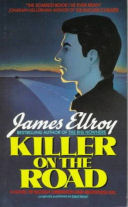 Killer on the Road, by James Ellroy Killer on the Road, by James EllroyIn a creative writing class years ago I wrote a piece of crap fantasy about a wanna-be serial killer who thought his evil thoughts while wearing a furry costume for a cartoon-animal-themed hamburger chain. It was so fucking horrible I burned it rather than turn it in. Reading Killer on the Road, I thought my own story had risen from the ashes. This is the weakest lamest shit Ellroy has ever written. |
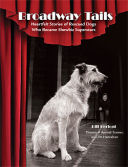 Broadway Tails: Heartfelt Stories of Rescued Dogs Who Became Showbiz Superstars, by Bill Berloni Broadway Tails: Heartfelt Stories of Rescued Dogs Who Became Showbiz Superstars, by Bill BerloniI’m sorry to say this one was a disappointment. When Terri Gross interviewed the Bill Berloni on NPR, he said all sorts of fascinating things about the many animals he’d trained for the stage. He was full of wonderful, touching stories. Turns out most of that stuff is not in the book . . . apparently the publisher wanted more cowbell; i.e. more chitchat about Broadway celebrities. I wish Bill Berloni had written the book he talked about on the radio! |
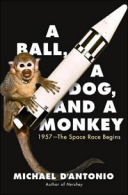 A Ball, a Dog, and a Monkey: 1957 — The Space Race Begins, by Michael D’Antonio A Ball, a Dog, and a Monkey: 1957 — The Space Race Begins, by Michael D’AntonioA fascinating history of the first two years of the space race, 1957 and 1958. Michael D’Antonio’s purpose is strictly limited to the early Soviet and U.S. efforts to hurl objects into space, from the first Sputnik to the U.S. launch of an entire Atlas missile carrying a recording of President Eisenhower reading a message of peace, a launch carried out not really to broadcast a message of peace, but to put the Soviets in their place by placing the heaviest object yet into orbit. I remember a lot of this stuff . . . I was 11 and 12 when it happened, out in the backyard every night looking for Sputnik and the follow-on American and Soviet satellites, glued to the TV and radio whenever anything space-related came on, following every word of Werner von Braun whenever he appeared on the Disney show (which was often). Exciting times. A Ball, a Dog, and a Monkey is entertaining and educational: I now know much more about the mysterious Russian space program and the interservice rivalries that accompanied the American effort. Most of all, I came away terribly impressed with the wisdom and leadership of Dwight D. Eisenhower, who kept his perspective about early Soviet space victories and managed to organize an effective US space program in spite of squabbles between the Navy, the Army, and the Air Force, not to mention the machinations of the military-industrial complex. And Laika . . . what a sad end for such a brave dog. I’m happy someone finally wrote a book giving Laika the attention she deserves. |
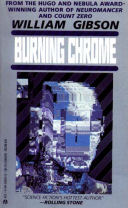 Burning Chrome, by William Gibson Burning Chrome, by William GibsonA collection of William Gibson short stories; a few of them co-written with other authors. The pure William Gibson stories are quite like his longer novels: an obsession with all things Japanese, mechanically enhanced people, odd loners, evil corporate villains, Matrix-like voyages through visualized data in cyberspace — you can see Gibson working his way toward the Blade Runner screenplay. I enjoyed each of these stories, but was far more enthralled with the co-written ones, which combined classic science fiction with Gibson’s own near-future themes. It’s been a while since I last read a collection of good science fiction stories; I was quite satisfied with this one. |
 Wonder Boys, by Michael Chabon Wonder Boys, by Michael ChabonMichael Chabon is a terrific storyteller, even when he creates characters I hate. Grady Tripp, a selfish philandering doper who consistently fucks up everything worthwhile in life, is a frustrating protagonist, but as mad as I got at him, I couldn’t stop turning pages. This is not the grand story of an era, like Kavalier & Clay, or a tale of an alternate world, like The Yiddish Policemen’s Union. This is the story of a loser on a weekend bender . . . but I was moved, and fascinated, and sorry to see the story end. And for the rest of my life I’ll be thinking about that tuba case. If one ever falls into my hands, I’m opening it first thing! |